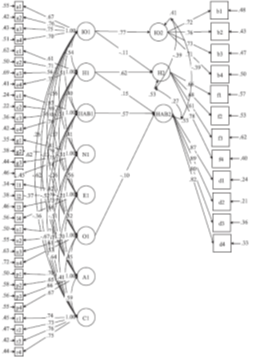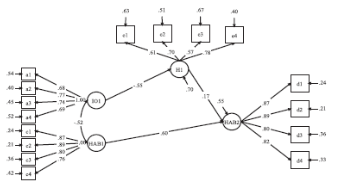夏凌翔教授指导的本科生的论文在攻击领域的权威期刊发表
敌意归因偏向指在模糊情境下将他人的行为意图归因于敌意与挑衅的倾向。其被认为是攻击和其他反社会行为的重要认知性风险因素。尽管已有不少研究探索了人格与敌意归因偏向之间的相关关系,但是哪些人格特质能纵向预测它,这种预测背后存在什么样的中介机制;特别是立足中国文化的积极人格变量能否抵御这种不良的认知倾向,以及这种抵御作用是否具有独立于西方人格的独特效应等重要问题还不清楚?以西南大学心理学部夏凌翔课题组的大四本科生王雅婕为第一作者、夏凌翔教授为通讯作者的论文“The Longitudinal Relationships of Interpersonal Openness Trait, Hostility, and Hostile Attribution Bias”就针对这些问题,探讨了立足中国文化的人际自立中的人际开放特质对敌意归因偏向的预测,以及敌意态度在其中的中介作用。该论文已经在攻击领域的权威期刊Aggressive Behavior(SSCI一区)发表(https://onlinelibrary_wiley.gg363.site/doi/abs/10.1002/ab.21862)。
研究者从六个不同的省份共选取了1120名大学生进行了间隔6个月的纵向追踪研究,最终获得932份有效数据(84.11%保留率,38.5% 男性)。采用交叉滞后模型(图1)进行的分析表明,人际开放可以预测6个月后敌意态度,敌意态度可以纵向预测敌意归因偏向,并且这些预测效应都是独立于大五人格的。进一步的中介模型分析(图2)显示,人际开放可以通过敌意的纵向中介作用来跨时间地预测敌意归因偏向。

图1 交叉滞后模型

图2 中介模型
据此,研究者提出:某些敌意心理因素之间存在预测关系;积极的人际特质(例如,人际开放和宜人性)可以抵御敌意心理因素(例如敌意态度、敌意归因等)的发展;立足中国文化的人际特质具有西方人格所不具备的积极功能,对于维护中国人的心理健康与人际和谐具有独特作用;通过培养积极的人际特质(特别是立足中国文化的人际特质)可以有效抑制中国学生的敌意心理的形成和发展。
原文摘要:
While the relationship between personality, hostility, and hostile attribution bias has been explored in previous studies, their longitudinal relationship is unclear, and no related study has utilized the indigenous Chinese personality. This research explored the longitudinal relationships of interpersonal openness (an indigenous Chinese personality construct), hostility, and hostile attribution bias. The 942 valid participants (38.5% male, mean age = 20.83, SD = 1.04) were from six different provinces in China. Measurements were completed on two separate occasions (Times 1 and 2), with a 6-month interval. Results showed that interpersonal openness has longitudinal effects on hostility, after controlling for the Big Five, and hostile attribution bias could be longitudinally predicted by interpersonal openness and hostility as well. Moreover, hostility served as a mediator in the relationship between interpersonal openness and hostile attribution bias. These results suggest that interpersonal openness can affect the development of hostility and hostile attribution bias, and some indigenous Chinese personality factors may complement Western personality theories.





